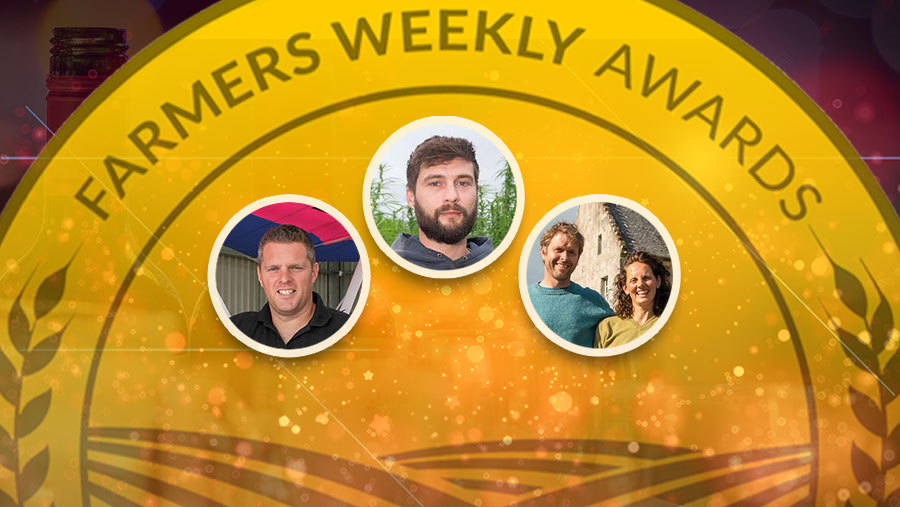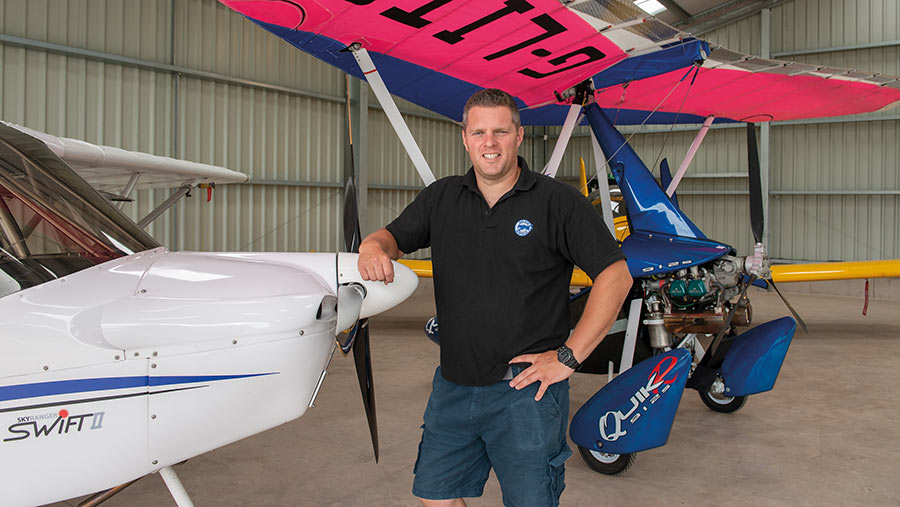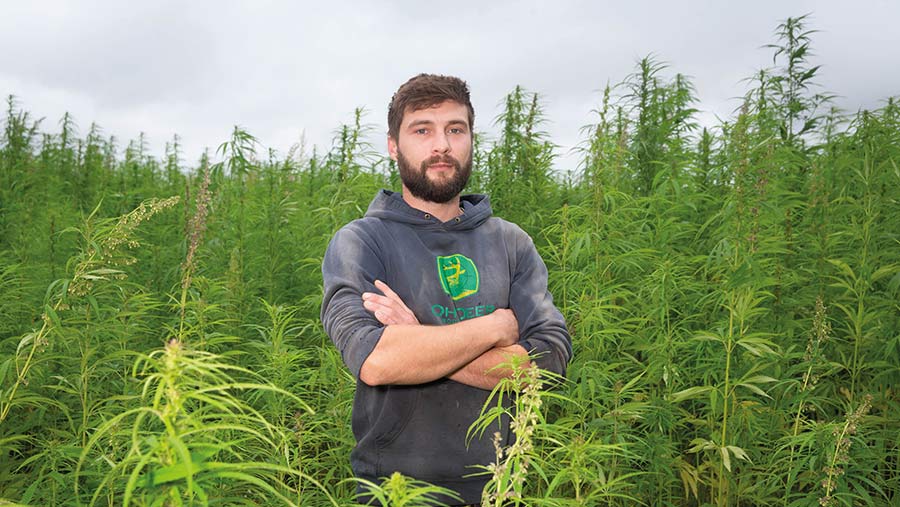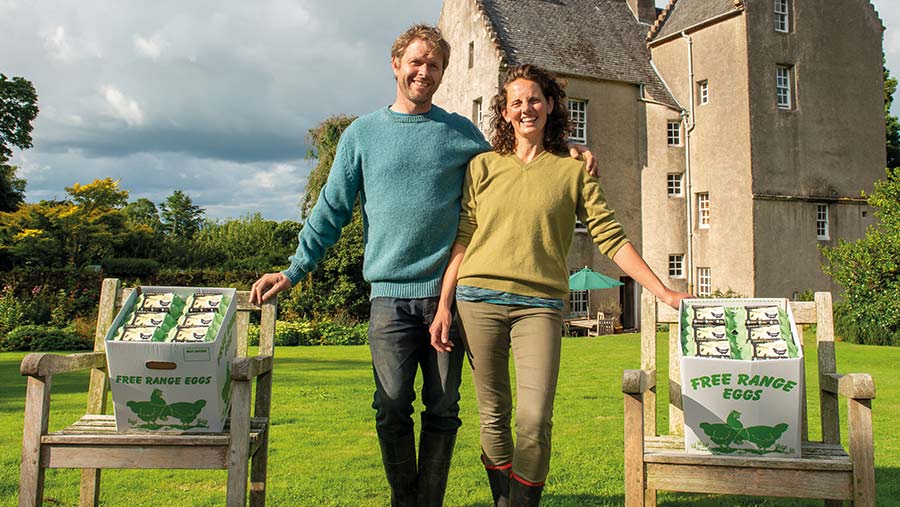Farmers Weekly Awards: 2021 Diversification of the Year finalists

Innovation and bold decision-making, coupled with enthusiasm and unrivalled knowledge of their businesses, are the hallmarks of this year’s Diversification finalists.
See also: Farmers Weekly Awards: Diversification finalists 2020
The finalists:
- James Alexander
Balado Airfield, Lincot, Kinross - Edward Burman
Hemp Whole Foods, Kingstanding Farm, Warwickshire - Alison and Fergus Younger
Old Leckie Farm, Gargunnock, Sterling
The judges:
The judges visited each finalist for a three-hour visit and a tour of their setup. The diversification judges are:
- Alice Maltby, Tom and Henry Wilson
Last year’s winners - Edward Mowbray
Farmers Weekly’s senior machinery reporter - Oliver McEntyre
National agricultural strategy director at Barclays
James Alexander
Balado Airfield, Lincot, Kinross

© Angus Findlay
Following a speculative letter responding to a newspaper advert seeking a festival site in Fife, Balado Airfield attracted some of the biggest music artists in the world and more than 300,000 festival goers at its peak when it played host to T in the Park.
However, after 18 years, authorities deemed that a North Sea oil pipeline running across a corner of the airfield posed a risk to public health, and new planning restrictions slashed daily visitor numbers from a maximum of 90,000 to just 100 on some parts of the site.
This made the festival untenable and forced the organisers to relocate. It also left James Alexander with a gaping hole in his income, which the 80ha arable farm could not fill.
Without subsidies, the small arable acreage just breaks even in a good year. But rather than throwing in the towel, James wanted to make the most of the 40ha airfield and revive what was RAF Balado Bridge, used in the Second World War to train Spitfire and Hurricane pilots.
Passion for flying
Flying has been lifelong passion for James and, with a lack of private aircraft hangers and storage in the area, he spotted an opportunity for a one-stop flying shop based at the historic airfield.
The business offers hangarage for aircraft, along with flight lessons and experiences on managed runways, a members’ club and café, along with space for small events.
Convincing banks and lenders to stump up the cash was well outside Mr Alexander’s comfort zone, but grants secured from Leader Funding and Scottish Enterprise offered a large injection of cash to get the project of the ground. Investment at the end is estimated to be around the £1m mark.
A personal achievement is the creation of two scholarships to local children in the area. These allow 10 hours of free flying time to 16- to 18-year-olds interested in aviation and cost the business about £2,000 each.
Groundworks
James knew that with his farming background, the majority of the groundworks could be undertaken in house, without involving expensive external contractors. The hangers were cleverly designed to offer other renting opportunities should the aviation project not work out – the three buildings are within the threshold which allows small businesses to claim rates relief.
Other groundworks included 700m of solid roadways taking cars to a purpose-built car park, which allows access even when the weather turns. A suite of classrooms and offices with toilets and a new sewage system mean the premises are capable of hosting larger events.
Extra income
James’ commitment to the Blue Skies business has inevitably meant the farm playing second fiddle, and using his time wisely has been essential. He now employs contractors to drill, spray and harvest his crops, with he takes care of cultivations. He still enjoys a day on the tractor, but the need to grow a business is also paramount.
He has recently undertaken the sale of Nanotrikes – a single seat 33hp microlight-style flying machine which can be operated without a licence. James sees a big growth area for these and being able to show potential buyers how they work in a purpose-built area will have great benefits.
The vast site at Balado has future opportunities such as developing the 7ha of woodland into a nature trail for schools to visit or turning one of the areas into an off-road course. He is also exploring axe throwing and archery as sideline activities. He also hosts a helicopter once a year for ticketed customers to have a flight experience.
The judges say
It could have been easy to sell the farm after losing the festival income but James’ determination, vision and appetite for aviation has created a profitable new income stream to support the small farm acreage and allow him to live out his passion in real life.
Summary
The judges liked
- Turned a huge passion for aviation into a reality
- Logical and well thought-out business plan with careful investments
- Taking a lot of work in house to reduce costs
- Clear customer base
- Strong brand that has potential to be recognised nationally
Farm facts
- Fourth-generation family farm
- 80ha arable
- 40ha Second World War airfield
- Combining, drilling and spraying contracted out
- Machinery shared with airfield to reduce costs
The numbers
- 500cu m of concrete laid on the site
- 15 current storage lots for aircraft
- 18 years hosting T in the Park
- 3 purpose-built hangers
- 700m of internal roadways
Edward Burman
Hemp Whole Foods, Kingstanding Farm, Beausale, Warwickshire

© Tim Scrivener
Edward Burman left a dream job testing Aston Martins to return to the family farm and start growing a crop with a somewhat dubious reputation. However, his boundless enthusiasm and knowledge of industrial hemp has seen the fledgeling business take off.
The 320ha farm was never going to support Edward and his father, so diversifying to provide extra income was essential. After extensive research into hemp and how he could use the plant to sell products direct to the public, he planted his first crop in 2019. This was after achieving licencing from the home office in what is an arduous process and a considerable challenge to find suitable acreage to meet the criteria.
He and his partner started Hemp Whole Foods on the farm, processing the hemp seed onsite in a converted lorry container, beginning with food and cosmetic products whilst educating his customers on the benefits of hemp.
Brave new world
The farm has now harvested its second crop of hemp, with the third due this September. All the seed is cold pressed for cooking oil, while the high-protein by-product is hand mixed and fed to the farm’s spring lambs – slashing bought-in feed costs by £5,000 so far.
Edward has seen huge benefits to the arable rotation, too. The hemp has replaced a chunk of oilseed rape, with cleaner crops in the years following hemp and chemical savings totalling nearly £10k due to hemp’s low input nature. Planted in late spring, its fast-growing attributes means it outcompetes weeds and can also sequester carbon 25 times faster than trees.
It’s not all great news, though. Harvesting the crop is a challenge as hemp has the highest tensile strength of any natural fibre, and Edward and his father have redesigned combines and headers to prevent the long stems wrapping around the moving parts on the harvester.
Expensive seed
One of the stipulations in the home office licence means it is illegal to replant your own produce, so all seed is EU certified, which creates the largest investment for the entire production process and has big risk implications going forward regarding import tariffs.
The main product is the cooking oil which can be used as a healthier alternative to the traditional oils. Alongside this is the Hemp Whole Foods soaps, hand balms and bath bombs boosting the product range. The focus, for now, is on cosmetics, but the medicinal benefits may be a lucrative market in the future.
Juggling the farm and the hemp business is tricky for Edward, especially at lambing time. He works long hours, rarely leaving the farm and he can be double shifting between helping pregnant ewes and tying hessian hats on hemp oil bottles.
The labour intensive set up means every seed is shovelled by hand, twice. Further investment is afoot with an external bunker on the container able to hold the seed and be loaded by telehandler. With so few growers of hemp in the UK, Edward has researched extensively to understand the crop’s needs.
Route to market
Edward refused his product to be stocked in a well-known supermarket as he feels the message about hemp and the benefits it has in the countryside would be diluted sat on a shelf with no explanation. His route to market is via local farm shops and producer markets, health food stores and growing online sales via the website.
A big achievement for the company was the creation of a full-time job to assist with marketing and selling at local markets, along with product management. Social media is a challenge due to the stigma around the crop, but people’s perception is changing through lobbying and live video streams of the production process and the environmental benefits it can bring with reduced artificial inputs, late flowering and ground cover for nesting animals.
The judges say
A bold burgeoning business that has overcome many challenges due to the public perception of hemp. However, the determination of Edward to make a success of it and the benefits hemp brings to the farm are undoubted.
Summary
The judges liked
- Passion and knowledge for a burgeoning business
- Keen to educate public about benefits of hemp and remove the stigma
- Hard working – juggling farm and hemp businesses
- Integrated hemp neatly into arable rotation offering multiple benefits
- Strong branding and clear messaging on products
Farm facts
- 2019 was the first time the farm grew hemp
- 550 north country mules
- Farm size is 320ha
- All older equipment fixed in-house
- Other crops include milling wheat, linseed, barley, beans and oilseed rape
The numbers
- £6.99 retail price for a bottle of hemp oil
- 2 jobs created since Hemp Whole Foods started
- 5,500 bottles of oil sold
- 36% oil content in hemp
- 20,000+ uses for hemp
Alison and Fergus Younger
Old Leckie Farm, Gargunnock, Sterling

© Angus Findlay
When Alison and Fergus Younger came back to Fergus’ family farm in 2012, there was a determination to make the business self-sufficient, with a long term aim to reduce the dependence on subsidy payments, which in 2010 stood at 30% of the farm’s total income.
The 120ha beef and sheep holding had limited routes to market for its produce and, after some detailed business evaluations and analysis of future income possibilities, the couple kick-started their ambitious long-term goals by securing funding to convert an old steading building on the farm into a three-bedroom self-catering unit.
This decision would not only provide an income stream for the farm for years to come, but would repay the loan that was needed to match the funding and give the finances a boost for future investment.
Eggs
Some of the figures thrown up by the evaluation were difficult to stomach – such as losing £300 a head on the suckler herd – and forced a change of approach. The plan was to finish more beef, lamb and pork themselves and sell direct to individuals and wholesalers to increase profit margins. Highland cattle were also added to the offering.
Initially, a tie-up with a local farm shop was considered the best route to market for their meat, along with eggs from the newly acquired 350 hens. However, the farm shop couldn’t maintain the agreed price and the Youngers set about marketing their produce themselves.
However, access to the farm was poor and the couple had limited staffing resources, meaning the traditional farm shop model wouldn’t have worked. Instead a home delivery service to three local villages was trialled to shift the produce from the layers.
The system is as low maintenance as possible to maintain a decent margin, with a monthly subscription service and invoicing to keep paperwork to minimum. Hen numbers are now up to 1,300, with 56% of the eggs sold into wholesale such as local shops, and 44% direct onto doorsteps.
Going online
As demand for the eggs grew, other produce such as potatoes and mixed leaf salad bags was added, and customers have been signed up on the same subscription basis as the eggs. The decision to start finishing their own cattle, lamb and pork meant gaining full control of the chain, from rearing to delivery.
The first coronavirus lockdown increased customer numbers by 50% and doubled turnover on meat sales, and extra hens were added to keep up with orders. A move to a Shopify online ordering platform has allowed Alison and Fergus to track orders, monitor new product sales and note returning customers – this will allow a more targeted approach to marketing going forward.
A wider audience has also been reached through the online shop – meat boxes have been shipped as far as Devon. Stock control can be especially challenging when products become popular, and customers are kept up to date via weekly newsletters and social media posts.
Full circle
The story of provenance and positive storytelling are key messages portrayed by Old Leckie. There is very little waste, all broken eggs can be composted or fed to the pigs, hen bedding is mixed with FYM for fertiliser to reduce brought in bags. Eggs that don’t quite make the grade are given to the local food banks.
Waste wood chips and shavings from the biomass boiler is used as litter for the hens. There has been a considerable effort in soil mapping to understand the soil, with clover and grass mixes introduced so finishing stock on their own grass with few additional inputs is possible.
The judges say
Alison and Fergus exude enthusiasm and knowledge about their business and have an astute model that others can follow. Using setbacks as fuel for success, along with careful planning and budgeting, has seen an innovative business flourish.
Summary
The judges liked
- Core values and links to the farm retained and promoted
- Financially sound business model that could be replicated
- Subscription model helps cashflow security with multiple customers
- Using setbacks as a positive to drive business forward
- Excellent customer engagement with weekly updates
Farm facts
- Fourth-generation family farm
- 120ha
- 1,300 laying hens
- 500 Texel/Lleyn sheep
- 60 Limousin cattle
The numbers
- 225 households delivered to on a weekly basis
- 50% increase in customers during first lockdown
- 15 miles customer radius of the farm
- £3.80 price for a dozen large eggs
- £140 price for a 10kg box of beef, shipped nationwide
Sponsor’s message
 “At A-Plan Rural we understand that diversification allows farmers to spread their risk and grow their revenue, now more than ever. The three finalists in this year’s competition have shown innovation and determination to build thriving businesses.”
“At A-Plan Rural we understand that diversification allows farmers to spread their risk and grow their revenue, now more than ever. The three finalists in this year’s competition have shown innovation and determination to build thriving businesses.”
Esther Kane, Head of Rural, A-Plan Rural Insurance
